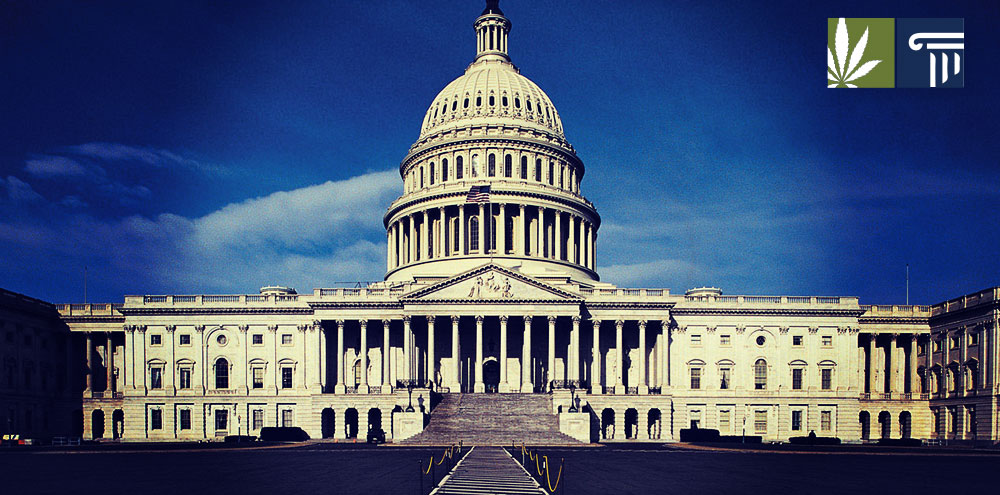Federal marijuana reform is on the table following two US Senate runoff election victories in Georgia that mean the Democrats have taken control of the legislative and executive branches of the federal government for the first time since 2008.
The two Democrat victors in the Georgia Senate runoff elections – Senators-elect Rev. Raphael Warnock and Jon Ossoff – are both proponents of federal marijuana legalization, with Ossoff in particular making the measure a key part of his election campaign.
Both the House and Senate leadership have now committed to passing comprehensive reform of the country’s cannabis laws. Incoming Senate Majority Leader Chuck Schumer filed a bill in 2019 to decriminalize cannabis and recently said a bill to federally legalize marijuana would pass within two years of his leadership with “Democratic and Republican votes.”
Meanwhile, the US House of Representatives has already passed several federal marijuana reform bills but, excluding the 2018 Farm Bill, they’ve all stalled in the GOP-controlled Senate headed up by Sen. Mitch McConnell. This includes a bill – the Marijuana Opportunity and Expungement (MORE) Act – passed by the House in December, 2019, to federally deschedule cannabis, expunge the records of those with marijuana-related convictions and direct tax revenues to communities most harmed by the US government’s war on drugs.
The two other federal marijuana reform bills that cleared the House are the SAFE Banking Act, which would allow banks and financial institutions to service state-legal cannabis businesses, and the Medical Marijuana Research Act, which would expand access to high quality cannabis for research purposes. House Democrats included provisions of the SAFE Banking Act in the latest coronavirus relief package but this was removed from the final text prior to its approval.
“Unfortunately, under the GOP Senate leadership, the MORE Act, the SAFE Banking Act, and many other important reform bills were dead on arrival,” said NORML Political Director Justin Strekal. “By contrast, Democratic leaders in the Upper Chamber — including Senators Schumer, Wyden, Booker, Merkley, Smith, Sanders, and others — have already pledged publicly to debate and advance legislation to end federal marijuana prohibition via descheduling.”
“Senator Schumer’s ascension to Majority Leader will mark the first time in US history that the upper chamber is led by a Senator who is openly calling for cannabis legalization,” Strekal added.
With the Senate and House now tilting toward federal marijuana reform, attention will once again turn to President-elect Joe Biden who’s stopped short of endorsing full cannabis legalization in favor of piecemeal reforms such as rescheduling, decriminalization, expungements and the increased use of drug courts instead of criminal courts for offenders. His past record as a senator pushing harsh criminal penalties for drug users gives cause for concern that he may attempt to stymy comprehensive federal marijuana reform.
But the conversation surrounding drug policy has changed so radically in recent years and the measure enjoys such unprecedented support, not least of which from his Vice President-elect Kamala Harris, that it would likely prove fruitless to try and stand in the way. Sen. Ed Markey went so far as to say federal marijuana legalization would pass irrespective of whether Biden as president approved of the measure or not.
Some of Biden’s cabinet picks thus far reflect this ambivalence. His choice for attorney general, Merrick Garland, has made few public pronouncements on marijuana legalization but in a 2013 federal appeals case on cannabis scheduling, he suggested scientists should defer to the DEA when it comes to determining marijuana’s classification as a controlled substance. His pick for Commerce secretary, on the other hand, is a somewhat reluctant supporter of legal marijuana who, as governor of Rhode Island, called for state-run cannabis dispensaries. Meanwhile Biden’s choices for secretary and assistant secretary of the US Department of Health and Human Services are marijuana reform advocates who are now positioned to push for cannabis rescheduling through a medical and scientific review that would be binding on any decision made by the attorney general regarding the plant’s classification.
While much remains unknown, it’s clear that with a Democrat-controlled Congress and marijuana reform bills in waiting, there’s never been a better time to push for an end to the federal prohibition of cannabis. A window has opened but perhaps only for the next two years at which point it’s possible the Republicans will reclaim at least one of the chambers of Congress. It’s up to lawmakers in the House and Senate to force President-elect Biden into action and not let this opportunity pass.






